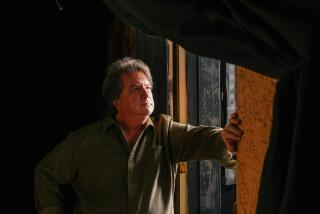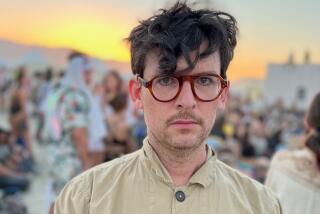Danny Hoch and ‘Taking Over’: He’s a stranger in a strange land
As Danny Hoch ambles through Echo Park, a familiar sight catches his eye. Although he’s far from his home in the Williamsburg area of Brooklyn, Hoch instantly recognizes the telltale signs of approaching urban Armageddon: pasty-faced guys in porkpie hats, prowling for overpriced espressos; pierced and tattooed young women pushing strollers; a vintage clothing store rubbing elbows with a Salvadoran pupusería.
The spray-painted handwriting is on the wall: Here come the trendies, there goes the neighborhood.
“OK, here’s a good example,” says Hoch, the Obie Award-winning solo performance artist whose latest one-man show, “Taking Over,” about the dark side of gentrification, opens Friday at the Kirk Douglas Theatre in Culver City.
“Here we have our little hipster couple,” Hoch continues, nodding toward a bohemian pair perambulating west on Sunset Boulevard. “They’re not bad people, but they’re certainly in their costumes. And back over here -- turn around real quick, you’re missing them! -- were two sort of neighborhood folks. Now, the neighborhood folks are hanging out on the corner, because this is their neighborhood and they feel proprietary about it. And those folks [the hipsters] are looking in the stores to see what they can buy.”
Reading his words flat on the printed page, you might not guess that Hoch’s tone is, for the moment, more gently amused than righteously indignant. He’s relishing the ironies, not raining sociological fire and brimstone. After all, he’s making this tour of rapidly gentrifying Echo Park/Silver Lake at the behest of a Times reporter, not for any agitprop agenda of his own.
But he acknowledges that his razor-edged observations make certain people feel very defensive, provoked, even outraged. “When I say things like that, they sound really divisive, probably, and at times maybe even bigoted,” he says. “I think what happens in my show . . . is that you walk in and you feel assaulted and insulted, and then you walk out more confused and [angry] than when you walked in.”
Such responses certainly aren’t uncommon to “Taking Over,” which a New York Times critic favorably described as a “fiery polemical portrait gallery of a play” during last year’s run at Manhattan’s Public Theater. As in his previous shows, which include “Some People” (1994) and “Jails, Hospitals & Hip-Hop” (1997), in “Taking Over” Hoch displays his inordinate talent for replicating the verbal rhythms, physical tics and mental dispositions of a rush-hour F train’s worth of memorable New Yorkers.
In recounting how once-unfashionable, mixed-ethnic Williamsburg has been colonized in recent years by invading hordes of up-market developers and the bright-eyed young Midwestern transplants they attract, Hoch’s characters pull no punches and spare few expletives. One of them, the semi-autobiographical “Robert,” lambastes “yuppie alternative-rocker, post-punk white people -- and black people too” who’ve jacked up rents and run roughshod over local historical memory in their pursuit of an “authentic” urban experience.
Of course, Echo Park/Silver Lake isn’t Williamsburg, where, Hoch insists, the contrasts are even greater than in the Los Angeles hipster enclave. But the reaction to Hoch’s aggressive critique of the lifestyles of the white and privileged may not differ very much between East Coast and West Coast. Last Wednesday, at a free public talk at downtown L.A.’s Central Library, Hoch and performance poet Jerry Quickley were challenged by more than one audience member who didn’t take kindly to the insinuation that even well-intentioned urban liberals can be part of the problem of economic displacement.
Hoch, 38, refers to them as “the missionaries, the do-gooders, us white, progressive folks,” a category in which, tellingly, he places himself. Some send Hoch angry, self-justifying letters, which he reads at the end of his 90-minute, intermission-less show. They tell him that they do give back to their community, that they teach in Harlem, that they spend their money at local stores, that they had to leave Michigan or Oklahoma to make it as an actor in the Big Apple. Their common refrain, he says, is, “Well, then what am I supposed to do?”
“The indignant people on the left fail to realize that they can be teaching in a school and volunteering and voting for Obama and contributing to their neighborhood and kicking people out on their faces at the same time,” he says. “People fail to realize that they can be a housing activist or a gay-rights activist or any kind of activist and be causing police brutality at the same time.”
Although Hoch says he’s not deliberately trying to leave his audiences feeling apoplectic, providing playgoers with nothing more than a pleasant evening’s diversion never has been Hoch’s artistic aim.
An actor, playwright and director, Hoch launched his career as a public performer in the early 1980s as a rapper, break dancer and graffiti artist. “Hip-hop performance artist,” a label sometimes affixed to his earlier stage persona, is far too limited to describe the range of his accomplishments, which include published writings on race and class, acting credits in film (“Black Hawk Down,” “Lucky You”) and television, and founding the Hip-Hop Theater Festival, which has presented more than 100 hip-hop generation plays.
Over time, Hoch says, hip-hop to a certain extent got “co-opted” and diverted from its rebellious intent. It became removed from its “original tenets” of “self-determination and community.” Even so, hip-hop culture in its fullest sense -- which, he has written, incorporates social activism, education and community building, as well as various arts, and is not merely synonymous with rap music -- continues to be the foundation of all his work, says the former B Boy from polyglot, ethnically mashed-up Queens.
“True hip-hop will always form my world lens, even if I’m not talking about hip-hop. It always has and it always will. But it’s not rap music. It’s not pop music. You know, the sort of quote, unquote, ‘hip-hop artists’ that you hear on the radio now are not even rappers. They’re pop musicians who are rhyming and dressing in the code of what is would-be authenticity.”
Strolling through Echo Park in a white-and-sky-blue Adidas ensemble and sneakers, Hoch relates the back story of being a fourth-generation New Yorker whose Jewish ancestors settled in the Lower East Side and Brownsville, Brooklyn, after being driven out of Eastern Europe by the 19th century pogroms and other brutal displacement projects. “My family couldn’t go back to where they came from, because where they were from has literally been obliterated.”
Although his parents, the first in their families to attend college, later fled for the middle-class suburbs, Hoch has resolved to make his stand closer to his place of birth. “I’m not an expert on gentrification by any means. I’m just a guy who has embraced where he’s from, wants to stay there, believes in where he’s from.”
The problem, he says, is that nowadays “I feel like I’m a tourist in my own city and in my own neighborhood,” because he can’t walk half a block without tripping over privileged arrivistes who know little and care less about his hometown as anything other than a kind of Coolness theme park.
“I think I really made this show for my own mental health, so that I wouldn’t assassinate my new neighbors,” he says, making it clear (sort of) that he’s only half-serious.
“And they’ve done nothing wrong. They’re nice to me, we like each other, we get along. But I’m going to murder them. Because I feel like I can’t live at home anymore.”
More to Read
The biggest entertainment stories
Get our big stories about Hollywood, film, television, music, arts, culture and more right in your inbox as soon as they publish.
You may occasionally receive promotional content from the Los Angeles Times.







